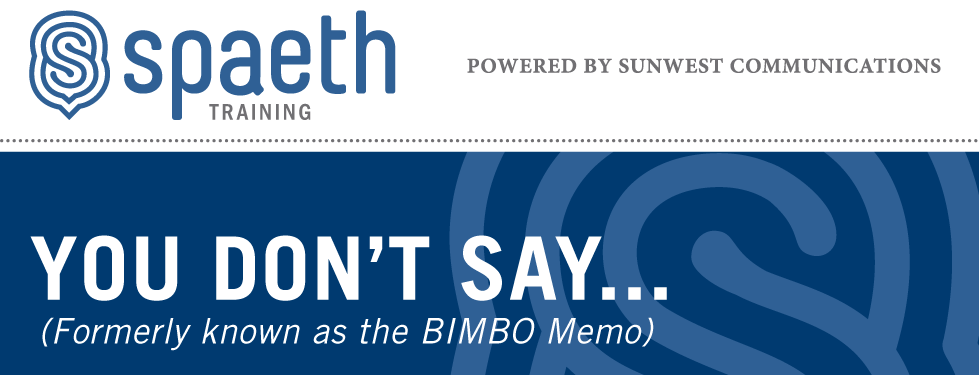[Newsletter] 12.11.23 | “It doesn’t necessarily taste great,”
December 7, 2023One of our most interesting months: comments include a mixed-up remark on a Connecticut study on traffic stops and a self-indictment from a Michigan fan about the storied rivalry with Ohio State. A lesson on rehearsing with the TelePrompTer from President Biden’s pardon of the Thanksgiving turkeys. USA Today sports columnist Mike Freeman apologizes to Lions’ coach Dan Campbell. A bad word from Elon Musk triggers a bigger concern, and a mayor in Ontario, Canada, provides a good example of how to use a white board as a tool for influence.
THE WINNING COMMUNICATIONS BLUNDER
“It doesn’t necessarily taste great,” isn’t a traditional denial causing the listener to overlook the denial but it’s the winning comment for the lesson learned. It comes from Chris Young, McDonald’s senior director of global menu strategy. Whoops! The announcement that McDonald’s is improving its burgers and buns was supposed to be good news. While it made news, it also triggered comments about how dissatisfied customers are. Young’s quote in its entirety was, “You can do it quick, fast and safe, but…” and then the “taste great” part. An example of the difference between a conversation with a reporter and using the media as a communication tool aligned with other formats and platforms. McDonald’s couldn’t keep out the reasons for the significant investment, but they can always control their own quote. Good ‘media training’ is about providing a good story to the reporter AND using media strategically for the enterprise.
The Wall Street Journal, “No More Dry Burgers: McDonald’s Overhauls Its Biggest Item,” November 30, 2023
THE RUNNERS-UP
“Most malls are not dying,” said Elliot Nassim, president of Mason Asset Management. This is the perfect example of a communication blunder, specifically the denial of a negative word. The front-page Wall Street Journal article has the descriptor “Zombie Malls” in its title, which gives away the article’s perspective. Mason is co-owner of the main mall featured in Wyomissing, PA. Nassim’s quote should have been “Most malls are surviving.” He goes on to say, “They’re just changing,” which is an example of what we call inverted speech. It’s where the speaker starts with a denial, usually suggested by the questioner, and then moves to what should be the message. Starting with the denial weakens the main message.
The Wall Street Journal, “Owners Keep Zombie Malls Alive Even When Towns Want to Pull the Plug,” November 26, 2023
“It’s not a collusion,” said real estate agent Dana Rice quoted in a lengthy piece examining the fallout in the industry from a federal jury in Missouri finding that the National Association of Realtors (NAR) and real estate brokers had conspired for decades to fix prices so that a seller paid a six percent commission. The damages could range between $1.5 to five billion dollars. The article contained interviews with a dozen agents. The communication lesson is that Ms. Rice’s quote exquisitely illustrates the issue. The five to six percent “standard” had become an embedded expectation – until the disruptive arrival of online listing sites. The article, while wide ranging, is also a window into the New York Times’ perspective and how that shapes even an in-depth piece. Of course, it was “collusion”!
The New York Times, “What the Landmark Real Estate Lawsuit Verdict Means for Realtors,” November 17, 2023
MIXED-UP COMMENTS
“Based on what I’ve seen and what I know, I don’t think it’s possible that this is not a deliberate misidentification of people,” said Luis Jiménez, associate professor of political science at the University of Massachusetts. This was a comment about a state-wide study allegedly finding that police identified Hispanic drivers who were pulled over for a traffic violation as white, skewing the statistics on racial composition. It rates lesson status because its convoluted nature makes it very hard to decipher the meaning.
Cape Cod Times, “Racial profiling stats in Massachusetts skewed by police misidentification,” November 20, 2023
“I know I sound like a creepy JFK conspiracist,” said Michigan alum Randy Sklar in a self-inflicted word wound. He was commenting on the feud between Michigan and Ohio State, both with 11-0 records. Michigan coach, Jim Harbaugh, is on a three-game suspension for allegations of sign stealing which he denies. Michigan fans are circulating the explanation that Ohio State drummed up the allegations to keep Harbaugh sidelined, while Ohio State enthusiasts say that violation explains Michigan’s last two victories over them. The whole brouhaha reads like one of the Dark Shadows comic books I wrote half a century ago. And Mr. Sklar, whose job is a sportscaster, describes himself accurately. The two WSJ reporters loved the whole thing.
The Wall Street Journal, “Sports and Political Warfare Have merged in Michigan-Ohio State,” November 24, 2023
We usually stay away from national politics, particularly anything critical of the sitting president (or any president), but there’s a lesson to be learned from President Biden’s remarks and delivery of the traditional pardoning of the Thanksgiving turkeys, Liberty and Bell, which happened to fall on his 81st birthday. First, the compliment: nice use of humor. The president said, “This is the 76th anniversary of this event. I want you to know I wasn’t there, and I was too young to make it up,” which got a good chuckle. Now the not-so-good news and the lesson. President Biden unaccountably referred to Taylor Swift’s current international tour in South America as Britney’s tour (Britney Spears is currently not on tour). OK, this doesn’t rise to international outrage, but it does provide an important lesson for our readers. If you’re using a TelePrompTer, unless you’re a network anchor, verbally read the material aloud first. That will turn up any unpronounceable names, hard to decipher formatted sentences and will show where the cues – ‘smile’, ‘pause’, ‘point’, etc. – should be and if they are differentiated. This caught the president up earlier this year when he was supposed to repeat a line for rhetorical emphasis but read the cue, “repeat the line.” If your CEO or client insists that they don’t need to do it, point to this example and note that my former boss, President Reagan, always tried to rehearse. Next lesson, the mistake will always crowd out the good part. See news coverage for proof. Finally, I read that Taylor Swift built in extensive rehearsals to the Eras tour performance and that the movie version was performed entirely without audiences, in other words, as a full out dress rehearsal.
NBC News, “Biden confuses Taylor Swift with Britney Spears in remarks on his 81st birthday,” November 20, 2023
APOLOGY FOR THE AGES
“I am the goofball meathead. I was wr…wr…(clears throat)…wrong. Wrong is the word I’m trying to say.” We typically cover insincere or rote apologies, but USA Today’s Mike Freeman’s apology to Detroit Lions coach Dan Campbell, stands as an Oscar-worthy apology worth reading and tacking up on the bulletin board for everyone who has been unfairly savaged by the media. Freeman had covered the coach’s first press conference – where he did say things like “we’re going bite a kneecap off…” – in which Freeman called him a “goofball meathead.” Now, as the Lions have transformed themselves into a great team and potential champions, Freeman is publicly eating his words and said that Campbell has “developed into a remarkable coach” and, even better, that it was a mistake to judge Campbell from the first press conference. The column, and the point it makes, could be useful to us who have clients and friends who may not be NFL head coaches but who deserve to be judged on their record and not a single, well, goofball remark. And while we’re at it, thumbs up to columnist Freeman. It took guts to do that.
USA Today, “I thought Lions coach Dan Campbell was a goofy meathead. I am in fact the goofy meathead,” November 21, 2023
WHAT STARTED AS A ‘BAD’ WORD TURNED INTO A REAL CONCERN
“Thermonuclear” was the word in the headlines about the lawsuit and response X owner Elon Musk launched against Media Matters after the platform announced that X was running ads next to content from white supremacist and other extreme groups. Major advertisers announced they were pulling their ads. Big Surprise. We were about to add “thermonuclear” to our list of ‘never use’ bad words, along with Nazi and Hitler, until we read Musk’s explanation. He charged that Media Matters “curated” the material and basically created their own universe by joining the ads and content and then boosting it themselves to give the appearance of widespread exposure. One of the publicized linkages was viewed only by two people, one of whom was the author of the Media Matters news article. This situation, if correctly described by Musk, is of such concern to us that we’re adding it to our list of comments and examples to bring to your attention.
The Daily Signal, “’Thermonuclear’: Musk Fires Back at Media Matters’ Manufactured Smear,” November 22, 2023
THE WRITE-ON TECHNIQUE
While every office has multiple white boards or easels with outsize Post It notes, the “write-on” technique as a presentation or communication device gets short shrift in comparison to PowerPoint or video, but it can be a powerful influence tool. See the example of Oshawa, Ontario Mayor Dan Carter, who won elected office with a moving personal story of addiction and homelessness, redemption and sobriety, and a platform that he could connect with the city’s most intractable problems. Driving home the problem and illustrating his strategy and commitment, in Mayor Carter’s office meeting room, written in color is a white board of the current annualized number of overdoses (398), homeless people (350), cost to the city for the overdoses ($365,000), and next to them, his solutions. We cite author Simon Sinek’s “Golden Circle” as our example of how to use something you write on as a tool, and we now add Mayor Carter’s example as a model. He could have had a printed poster, but the handwritten tally hangs as a constant reminder and makes it personal.
“You Don’t Say” is a reminder not to repeat and deny a negative word because of how the listener hears words. When you repeat and deny a negative word, the listener is likely to overlook the denial and hear the opposite of what the speaker is trying to say.

